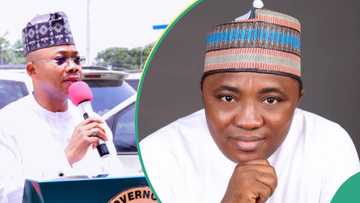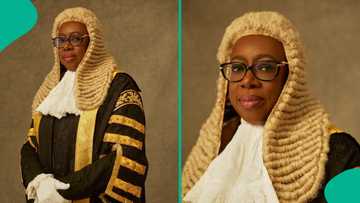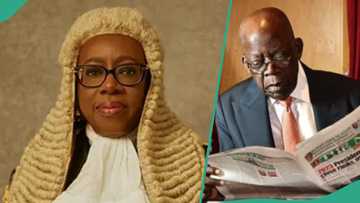Full List: APC, PDP Govs Justice Kekere-Ekun Decided Their Fates as Supreme Court Judge
Justice Kudirat Kekere-Ekun has been sworn in as the acting Chief Justice of Nigeria (CJN), pending her confirmation by the Senate. She took her oaths of office at 11:38 am, officially commencing her tenure.
Don't miss out! Join Legit.ng's Sports News channel on WhatsApp now!
With over a decade of experience as a Supreme Court justice since 2013, Kekere-Ekun brings a wealth of expertise and knowledge to the role. Her appointment follows the retirement of former Chief Justice Olukayode Ariwoola.

Source: Twitter
Born on May 7, 1958, Kekere-Ekun holds a law degree from the University of Lagos and was called to the Nigerian bar in 1981. She furthered her education with an LL.M. from the prestigious London School of Economics and Political Science in 1983.
When did Kekere-Ekun begin her career as lawyer?
Justice Kekere-Ekun commenced her legal career as a private legal practitioner in Lagos, serving from 1985 to 1989. Subsequently, in December 1989, she was appointed as a Senior Magistrate Grade II within the Lagos State Judiciary.

Read also
BREAKING: Tinubu sets agenda for Supreme Court as he swears in new CJN Kekere Ekun, "critical"
In 1996, she was elevated to the position of Judge of the High Court of Lagos State. Additionally, she served as Chairman of the Robbery and Firearms Tribunal from 1996 to 1999.
Her judicial career continued to progress when she was elevated to the Court of Appeal in 2004. During her tenure, she served in various divisions and held the position of presiding Justice of two divisions.
In 2013, Justice Kekere-Ekun was appointed to the Supreme Court of Nigeria, becoming the fifth female Justice to serve on the Court. Her swearing-in ceremony took place on July 8, 2013.
How many controversial judgments Kekere-Ekun delivered?
According to Business Day, since becoming the Supreme Court judge, Justice Kekere-Ekun has given verdicts or been part of the Juris on at least three governorship elections that set the pace for the governors in office.

Read also
BREAKING: Supreme Court delivers final judgement on suit seeking Gov Ododo’s sack, details emerge
The governors the Supreme Court judgment favoured are members of the Peoples Democratic Party and the All Progressives Congress (APC).
Below is the list of the governors:
Hope Uzodinma v. Emeka Ihedioha in Imo
The case involved the disputed 2019 Imo State gubernatorial election, where Hope Uzodinma (APC) challenged Emeka Ihedioha of the PDP's victory. The Supreme Court, led by Justice Kudirat Kekere-Ekun, delivered a controversial judgment in January 2020, declaring Uzodinma the winner.
The court's decision was based on the inclusion of results from 388 previously excluded polling units, which significantly altered the outcome of the election. Justice Kekere-Ekun read the judgment, sparking debate and controversy over the court's decision and its implications for the electoral process in Nigeria.
Ademola Adeleke vs Gboyega Oyetola in Osun
The case involved a dispute over the Osun State governorship election between Senator Ademola Adeleke (PDP) and Governor Gboyega Oyetola (APC). Adeleke challenged the election results, citing irregularities and misconduct, and appealed to the Supreme Court to overturn Oyetola's victory.
However, the Supreme Court, with Justice Kekere-Ekun on the panel, affirmed Oyetola's election as governor and dismissed Adeleke's appeal. The court's decision was based on Adeleke's failure to provide sufficient evidence of substantial non-compliance with the Electoral Act during the election, thereby upholding Oyetola's win.
Nyesom Wike vs Dakuku Peterside
The case centred on the disputed 2015 Rivers State governorship election, where Nyesom Wike (PDP) was declared the winner, but Dakuku Peterside (APC) contested the results. The Supreme Court, with Justice Kekere-Ekun on the panel, ultimately upheld Wike's election as governor.
The court dismissed Peterside's appeal, ruling that the election was conducted in substantial compliance with the law. Justice Kekere-Ekun emphasized that the Electoral Commission's regulations and guidelines cannot be used to question the election's validity if they do not contradict the Electoral Act itself.
Kekere-Ekun also clarified that the use of card readers did not replace manual accreditation, as provided for in the Electoral Act. This ruling reinforced the legitimacy of Wike's victory, putting to rest the dispute over the 2015 Rivers State governorship election.

Read also
Justice Kudirat Kekere-Ekun: 5 things to know about New CJN who succeeded Olukayode Ariwoola
Tinubu returns to Nigeria from France
Legit.ng earlier reported that President Tinubu is scheduled to return to Nigeria two days after leaving for France.
The president is returning to the country on Friday, August 23, to swear in the new chief justice of Nigeria, Justice Kudirat Kekere-Ekun.
This is as Justice Olukayode Ariwoola retired from the service as the Chief Justice of Nigeria on Thursday, August 22.
PAY ATTENTION: Unlock the best of Legit.ng on Pinterest! Subscribe now and get your daily inspiration!
Source: Legit.ng



